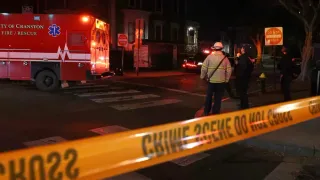December 19, 2015
Natasha, Pierre and the Great Comet of 1812
Robert Nesti READ TIME: 7 MIN.
Ever get punch-drunk from a musical? A heady, intoxicating feeling that leaves you joyfully disoriented, giddy even? It's a rare occurrence, like seeing a meteor in the night sky, but it is happily happening now at the Loeb Drama Center where the spectacularly entertaining "Natasha, Pierre and the Great Comet of 1812" has taken up occupancy through January 3.
The contact high begins upon entering the theater. First in the lobby, covered in plastic as if at a construction site; then in the auditorium, which is now configured as a Russian nightclub, with red fabric walls covered with hundreds of paintings adorning its walls. The proscenium has been stripped away; instead the stage is filled with tables and banquettes that intersect with walkways, platforms and stairs. Even the raked seating is bisected with platforms on which the action takes place, and hanging from the ceiling are chandeliers that make the Loeb resemble a mini-Metropolitan Opera House. The genius behind the design elements is Mimi Lien, who has expanded what she had constructed for the show's two previous pop-up productions in New York.
What's transpiring in the space is an opera, but hardly a traditional one. Instead, composer/librettist Dave Malloy has fashioned is a through-sung mash-up of musical styles that tell a story lifted from a section of Tolstoi's "War and Peace." This 80-page fragment centers on Natasha, a na�ve member of the aristocracy, who comes to Moscow after being engaged to Andrey, who is away fighting the French. In Moscow Natasha is swept up in the social whirl where she becomes enamored of a handsome rake, Anatole, and spurns Andrey. When Anatole attempts to elope with Natasha, it is revealed that he's already married. Pierre, who is caught up in these romantic intrigues through family and friends, realizes he loves Natasha, who attempts suicide in her humiliation. At the musical's conclusion, the forlorn Pierre is rejuvenated with the sight of the great comet of 1812 as it sweeps across the sky.
Much of this feels like too much to take in on one sitting, especially since Malloy pretty much lifts his text directly from the novel (the songs aren't rhymed) and the action takes place throughout the auditorium, even right next to you if seated on the stage. Director Rachel Chavken is not afraid of having the actors plop next to an audience member and have musical conversation oblivious of their neighbors (How they maintain their concentration is a feat onto itself.) And the immersive effect is startling, not the least bit intrusive for an audience member. (I speak from experience having Natasha and her future sister-in-law Mary sit next to me for an icy exchange; later Pierre's wife H�l�ne nearly sat on my lap, but settled for an adjacent stool.)
Malloy's score is a marvel of diverse styles - Broadway popera, country and western, indie rock, EDM, Kurt Weill-inspired waltzes, echoes of Tchaikovsky, even a catchy children's round that introduces the characters in a cheeky fashion at the onset. In it you are told that there are so many with complicated names it suggested you refer to the program with its plot synopsis and organizational chart of the relationships to learn of them. Malloy's beguiling score acts as the spine that holds these wildly improbable elements together.
On the surface, in excising this section of "War and Peace," Malloy draws parallels to Tolstoi's even more tragic heroine Anna Karenina in a story that unfolds in the melodramatic fashion of a Hollywood potboiler. When the frantic narrative slows down in the second half, it is impossible not to be touched by Natasha's plight and Pierre's final epiphany. Up until then watching "The Great Comet" is like sitting in the middle of a big, whirling machine calculated to amaze. But Malloy and Chavkin have more on their minds than amusement for despite all the frivolity, this isn't a frivolous show - Malloy gets to the heart of the melodrama, mining the emotions; as well as its social context: Natasha's passion for Anatole is a no-no in Czarist Moscow, and that social order that eventually all but destroys Natasha is made accessible to contemporary audiences. This is a world that Todd Haines could turn into a series for Netflix.
Chavkin stages all of this with a Baz Luhrmann-like boldness. A colleague commented that it is like sitting in the midst of the film "Moulin Rouge," and this immersive approach gives the evening a bolt of energy that it might lack if it was done in a more conventional staging. She also is able to convey Malloy's cheeky style to the performances, which are over-sized and comic when they need to be, and intimate and touching when the story turns dark. A trip to the opera becomes a wonderfully funny put-down of the genre (Tolstoi was said to have hated opera and its conventions) and a second act production number, replete with traditional Russian dances, has the showmanship that recalls the best Broadway show-stoppers, except now fragmented into every corner of the theater. (I may be dating myself, but the closest equivalent to this staging I can think of was Harold Prince's desconstruction of "Candide" in the 1970s.)
Den�e Benton conveys Natasha's innocence with a wide-eyed looks and a clear-voiced soprano at the onset, then hits all the right marks as she becomes involved with Anatole and is scorned by Moscow society for her naivete. At first Scott Stangland's Pierre appears to get lost in the action. Some of this makes sense - he's a man of inaction; but from the moment he sings the powerful ballad "Dust and Ashes," he insinuates himself into the mad carnival around him and becomes a key player, ending the evening on a deeply poignant moment.
Nicholas Belton shows range as the noble Andrey and his father, the creepily comic Count Bolkonsky. Lucas Steele plays the caddish Anatole with a boyish charm and his high tenor is lovely. (He is also most easy on the eyes.) A quartet of actresses - Brittain Ashford (Sonya), Grace McLean (Marya D) Lilli Cooper (H�l�ne), Gelsey Bell (Mary) - each have a moment in divergent supporting roles, as do Nick Choksi (as Anatole bad boy bff Dolokov) and Paul Pinto (as a troika driver Balaga whose appearance kicks off the show's biggest number.)
Kudos to costume designer Paloma Young, whose intricate and quite lovely work can be easily scrutinized by audience it comes in constant contact with; and lighting designer Bradley King, who faced the most impossible task of providing the visual clues that allow the audience to follow the cast throughout the theater as well as enhancing the show's many moods. Sam Pinkleton provides the movement, which is held pretty much in check until it bursts forth in the second act.
As Malloy showed in "Ghost Quartet" earlier this year at Oberon, he is a stickler for how his show sounds. He provides his own orchestrations, which move between authentic Russian sounds to EDM and pop, exactingly conducted by Or Matias leading a small ensemble To this, add expert sound design by Matt Hubbs. Though given the kinetic nature of the staging and the non-rhyming structure, it might be wise to familiarize yourself with the score, which is available from a cast album.
It wasn't surprising to learn that the show is headed to Broadway in the fall with Josh Groban providing box office insurance starring as Pierre. This production, then, is something of its pre-Broadway tryout. Some had wondered how the show, which played in New York in non-traditional spaces, would adapt to a more conventional theater. That it does with such a spectacular and hugely entertaining way is credit to the divergent creativity of all involve. "Natasha, Pierre and the Great Comet of 1812" is such a unique amalgam of ideas that you fear it will burst and crash; it doesn't - it soars like the comet in its title. Here's a triumph well worth seeing if you are interested in the future of the American musicals (or even not.) And, hey, you might get a pirogi and a shot of vodka in the process.
Natasha, Pierre and The Great Comet of 1912 continues through January 3 at the Loeb Drama Center, 64 Brattle Street, Cambridge, MA. For more information visit the American Repertory Theater website.






